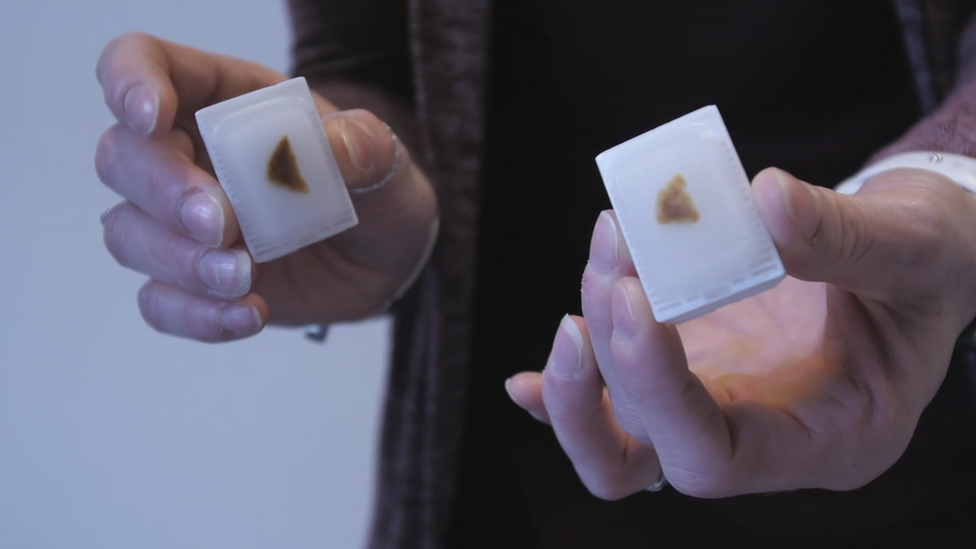The Scottish firm exporting blood, skin, spit and poo
- Published

Blood is one of the products the company exports
A multi-million pound Scottish company has won awards for its export success by supplying researchers worldwide with bits of people - and their waste.
Glasgow-based Tissue Solutions calls itself a "virtual biobank".
It arranges for samples of human tissue to be collected and delivered worldwide.
"Scientists and labs basically need human tissue to develop and test new drugs," says the company's founder and CEO Dr Morag McFarlane.
She told BBC Scotland's The Nine: "They need to go [to someone] who can collect it ethically and manage the whole process for them."

Dr Morag McFarlane said labs needed human tissue to develop and test new drugs
To be an export success, a company needs brains. Tissue Solutions has them, or at least bits of brains.
They can also deliver blood, saliva and more.
"We've even done hair," Morag says.
"And bizarre things like tongue, toes, fingers, poo."
Ah yes - samples of faecal matter.

Faecal matter was collected to develop a home-testing kit for bowel cancer
That particular product line began when another Glasgow company was developing a home-testing kit for bowel cancer.
They had been doing well enough in simulating the "biomaterial" by mixing water with a certain brand of bran-based breakfast cereal.
But as their research advanced the company needed the real stuff. So they called in Tissue Solutions.
"We worked with a local GP, and they recruited donors, collected the samples, processed them and then the company had the data," Dr McFarlane says.

Samples of liver can also be required by researchers
There are other ways of acquiring the samples, all of them certified as ethical.
In the case of tumours, hospital patients in Scotland automatically consent to having samples used for research purposes.
Groups of volunteers help with other commodities.
Some consent to have a 5mm hole being punched in their skin.
People with psoriasis have proved to be willing skin donors as their samples could lead to new treatments.

The tissue and body products can be gathered anywhere and delivered anywhere, provided the sourcing is ethical.
That means little of the material actually passes through Tissue Solutions' headquarters in the West of Scotland Science Park.
Fresh shipments
Organising collections and deliveries is the job of shipping and logistics manager Laura White.
"I've got a lot of fresh shipments happening today, mainly blood," she says.
"I have urine samples which are coming from Bulgaria and Romania, and both of them are coming in to a UK client.
"So logistically it's a case of keeping track of it every day, seeing what's getting shipped in, has it been delivered, get it to the client."

Those clients are not just looking for any old blood, spit or wee.
Frequently they want to test the effectiveness of candidate drugs on samples from people with the disease they are trying to fight.
The samples can be shipped at room temperature, such as tissues preserved in blocks of paraffin wax.
They can be deep frozen and held in dry ice at -80 Celsius.

Many products have to be kept deep-frozen
And increasingly the produce can be fresh.
One use for freshly excised tumour samples is for research trying to turn the patient's immune system against their cancer.
"People want fresh tumours," Dr McFarlane says, "so they can evaluate, in the actual tumour, what effect the drug has on the immune system, whether they can actually power the immune system to target the tumour and start killing it."
The market for human tissue and biomaterials is growing. One factor is campaigning against animal testing.
Another is that animal biology is not human biology. A potential treatment which has worked well in the laboratory and when tested on animals can fail when given to human subjects.
Tissue Solutions' international business has grown since its foundation 12 years ago and now employs 25 people.
Export success
The UK Department for International Trade points to it as an example of a life science sector which last year exported nearly £25bn in medicinal and pharmaceutical products alone.
But mention the uncertainty surrounding Brexit and Dr McFarlane groans.
The company has twice won a Queen's Award for Enterprise for its export success. Its overseas sales have grown by more than 200% in three years.
There is a determination that Brexit will not disrupt that.
"To counter it we've actually set up two new companies, one in Dublin and one in Lyon, so if we need to we can start working through those companies to make it easier," Dr McFarlane says.
The firm's rate of repeat business is running at 80%, an indication of high customer satisfaction.
But you can't please everyone.
They received an order for some specific biomaterial. Sorry, but we're talking poo again here.
The samples were frozen, sealed, boxed and shipped.
But the client complained. The poo was "too smelly".
Dr McFarlane laughs: "We had no answer for them.
"We couldn't say 'what do you expect?' But that's kind of what we all thought."